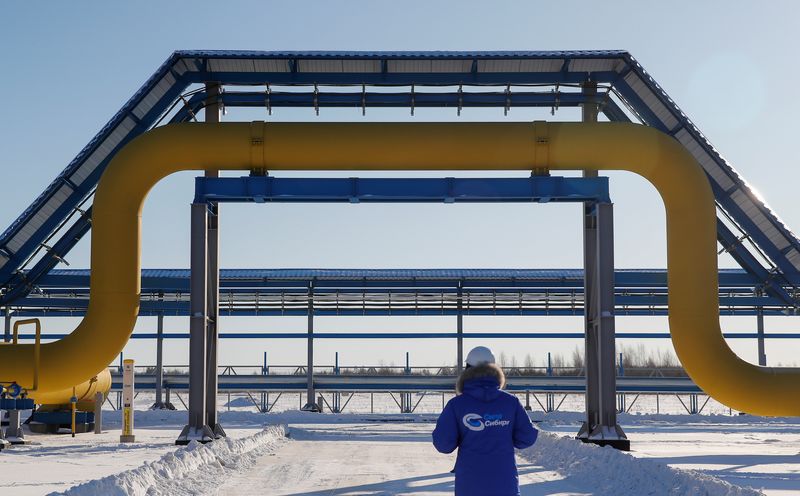By Nina Chestney
FRANKFURT/LONDON (Reuters) -Russia said it would work out practical arrangements by Thursday for foreign companies to pay for its gas in roubles, raising the probability of supply disruptions as Western nations have so far rejected Moscow's demand for a currency switch.
President Vladimir Putin's order last week to charge "unfriendly" nations in roubles for Russian gas has boosted the currency after it fell to all-time lows when the West imposed sweeping sanctions against Moscow over its invasion of Ukraine.
"No one will supply gas for free, it is simply impossible, and you can pay for it only in roubles," Kremlin spokesperson Dmitry Peskov told reporters on Tuesday.
The speaker of Russia's upper house of parliament, Valentina Matviyenko, said Moscow was ready if Europe refused to buy Russian energy and could redirect supplies to Asian markets among others, TASS news agency reported.
European countries, which mostly pay in euros, say Russia is not entitled to redraw contracts. The G7 group of nations rejected Moscow's demands this week.
European wholesale gas prices made further gains this week on concerns supplies could stop, although Russia has so far met contractual obligations for gas sales to Europe. [NG/EU]
Peskov said that, in line with a March 31 deadline set by Putin for the rouble payments, "all modalities are being developed so that this system is simple, understandable and feasible for respected European and international buyers."
G7 countries urged companies not to agree to rouble payments and said most supply contracts stipulated euros or dollars.
"That's a position that we share," a European Commission spokesperson told a news conference in Brussels on Tuesday.
The European Commision said last week it was assessing scenarios that included a full halt to Russian gas supplies next winter, as part of its contingency planning for supply shocks.
'MASSIVE DAMAGES'
Europe receives around 40% of its gas from Russia. Imports were at around 155 billion cubic metres (bcm) last year.
Putin's demand has stoked fears in Germany, Europe's top economy that is heavily reliant on Russian gas, about potential disruptions and the impact on industries and households should utilities fail to pay in roubles.
Without Russian supplies the German economy faced "massive damages, which should be avoided if in any way possible," E.ON Chief Executive Leonhard Birnbaum told German television, saying the country needed three years to become independent of Russian gas.
In case of disruption, he said Germany's gas network regulator would prioritise heating for homes over industrial use, so energy-hungry manufacturers such as steelmakers would bear the initial brunt of any supply cuts.
Data from Gas Infrastructure Europe shows European Union gas storage sites were 26% full now, highlighting the challenge of replacing Russia as an energy provider.
The European Commission has proposed legislation requiring EU countries to fill storage to at least 80% this year.
Markus Krebber, CEO of Germany's largest utility RWE and a customer of Gazprom (MCX:GAZP), said Germany could only cope with a complete halt to Russian gas imports for a very brief period.
The head of the Ukrainian gas transmission network also said Ukraine, through which some pipelines supplying Russian gas to Europe pass, needed to accumulate 17 bcm of gas for next winter by the end of October, saying this would be difficult.
Refinitiv analyst wrote in a report that EU storage would stand at 23% by Oct. 1 if Russian supplies were completely stopped through the summer and there was no additional supply.

"These levels are a direct threat to the energy supply security in Europe," the analysts said, adding that storage could reach 58% - still very low - if transmissions of liquefied natural gas (LNG) from northwest Europe was maximised and pipeline imports increased from alternative suppliers.
Washington and Brussels struck a deal last week for the United States to supply 15 bcm of LNG this year, although that would not alone fully replace Russian gas imports.